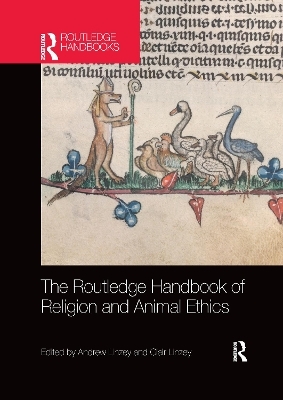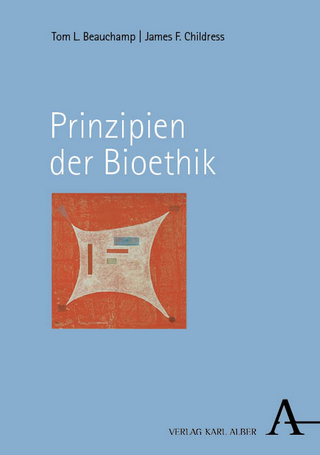
The Routledge Handbook of Religion and Animal Ethics
Routledge (Verlag)
978-0-367-73314-8 (ISBN)
The ethical treatment of non-human animals is an increasingly significant issue, directly affecting how people share the planet with other creatures and visualize themselves within the natural world. The Routledge Handbook of Religion and Animal Ethics is a key reference source in this area, looking specifically at the role religion plays in the formation of ethics around these concerns.
Featuring thirty-five chapters by a team of international contributors, the handbook is divided into two parts. The first gives an overview of fifteen of the major world religions’ attitudes towards animal ethics and protection. The second features five sections addressing the following topics:
Human Interaction with Animals
Killing and Exploitation
Religious and Secular Law
Evil and Theodicy
Souls and Afterlife
This handbook demonstrates that religious traditions, despite often being anthropocentric, do have much to offer to those seeking a framework for a more enlightened relationship between humans and non-human animals. As such, The Routledge Handbook of Religion and Animal Ethics is essential reading for students and researchers in religious studies, theology, and animal ethics as well as those studying the philosophy of religion and ethics more generally.
Andrew Linzey is the director of the Oxford Centre for Animal Ethics; an honorary research fellow at St Stephen’s House, University of Oxford; and a member of the Faculty of Theology in the University of Oxford. He is a visiting professor of animal theology at the University of Winchester and a professor of animal ethics at the Graduate Theological Foundation in Indiana. Clair Linzey is the deputy director of the Oxford Centre for Animal Ethics. She holds an MA in theological studies from the University of St Andrews and an MTS from Harvard Divinity School. She is currently pursuing a doctorate at the University of St Andrews on the ecological theology of Leonardo Boff, with special consideration of the place of animals.
Introduction: Toward a New(er) Religious Ethic for Animals Part I: Traditions 1. African Religions: Anthropocentrism and Animal Protection 2. Anglican Christianity: Animal Questions for Christian Doctrine 3. Buddhism: Paradox and Practice—Morally Relevant Distinctions in the Buddhist Characterization of Animals 4. Confucianism and Daoism: Animals in Traditional Chinese Thought 5. Evangelical Christianity: Lord of Creation or Animal among Animals? Dominion, Darwin, and Duty 6. Hinduism: Animating Samadhi—Rethinking Animal–Human Relationships through Yoga 7. Islam: Ants, Birds, and Other Affable Creatures in the Qur’an, Hadith, and Sufi Literature 8. Jainism: Animals and the Ethics of Intervention 9. Judaism: The Human Animal and All Other Animals—Dominion or Duty? 10. Mormonism: Harmony and Dissonance between Religion and Animal Ethics 11. Native American Religion: Restoring Species to the Circle of Life 12. Orthodox Christianity: Compassion for Animals 13. Rastafarianism: A Hermeneutic of Animal Care 14. Roman Catholicism: A Strange Kind of Kindness—On Catholicism’s Moral Ambiguity toward Animals 15. Sikh Dharam: Ethics and Behavior toward Animals Part II: Issues Human Interaction with Animals 16. "Nations like Yourselves": Some Muslim Debates over Qur’an 6:38 17. Invoking Another World: An Interreligious Reflection on Hindu Mythology 18. A New Ethic of Holiness: Celtic Saints and Their Kinship with Animals 19. Franciscan Justice, Peace, and the Integrity of Creation: A Creation without Creatures Killing and Exploitation 20. Animals in Christian and Muslim Thought: Creatures, Creation, and Killing for Food 21. "You Shall Not Eat Any Abominable Thing" (Deut. 14:3)—An Examination of the Old Testament Food Laws with Animal Ethics in Mind 22. Eden’s Diet: Christianity and Vegetarianism 23. Religion, Ethics, and Vegetarianism: The Case of McDonald’s in India 24. The Sacred and Mundane Cow: The History of India’s Cattle Protection Movement 25. Exposing the Harm in Euthanasia: Ahimsa and an Alternative View on Animal Welfare as Expressed in the Beliefs and Practices of the Skanda Vale Ashram, West Wales Religious and Secular Law 26. Animals in Western Christian Canon Law 27. Catholic Law on Bullfighting 28. Legal Responses to Questions of Animal Ethics and Religious Freedom 29. Veganism as a Legally Protected Religion Evil and Theodicy 30. Gratuitous Animal Suffering and the Evidential Problem of Evil 31. How Good Is Nature? The Fall, Evolution, and Predation 32. Evolution, Animal Suffering, and Ethics: A Response to Christopher Southgate Souls and Afterlife 33. Buddhist Rebirth, Reincarnation, and Animal Welfare 34. A Spark Divine? Animal Souls and Animal Welfare in Nineteenth-Century Britain 35. The Difference Bodily Resurrection Makes: Caring for Animals While Hoping for Heaven
| Erscheinungsdatum | 16.01.2021 |
|---|---|
| Reihe/Serie | Routledge Handbooks in Religion |
| Verlagsort | London |
| Sprache | englisch |
| Maße | 174 x 246 mm |
| Gewicht | 453 g |
| Themenwelt | Geisteswissenschaften ► Philosophie ► Ethik |
| Geisteswissenschaften ► Religion / Theologie | |
| Sozialwissenschaften ► Soziologie | |
| ISBN-10 | 0-367-73314-5 / 0367733145 |
| ISBN-13 | 978-0-367-73314-8 / 9780367733148 |
| Zustand | Neuware |
| Informationen gemäß Produktsicherheitsverordnung (GPSR) | |
| Haben Sie eine Frage zum Produkt? |
aus dem Bereich


